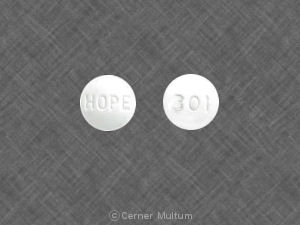Scopolamine
Generic name: scopolamine (oral tablet) [ skoe-PAH-lah-meen ]
Brand name: Maldemar
Drug classes: Anticholinergic antiemetics, Anticholinergics / antispasmodics
Scopolamine tablets have been discontinued. Scopolamine transdermal patches are still available
What is scopolamine?
Scopolamine reduces the secretions of certain organs in the body, such as the stomach and intestines. Scopolamine also decreases nerve signals that trigger your stomach to vomit.
Scopolamine is used to prevent nausea and vomiting caused by motion sickness or from anesthesia given during surgery.
Scopolamine is also used to treat certain stomach or intestinal problems, muscle spasms, and Parkinson-like conditions.
Scopolamine may also be used for purposes not listed in this medication guide.
Important Information
You should not use scopolamine if you have narrow-angle glaucoma, a blockage in your intestines, a severe breathing disorder, or if you are unable to urinate.
Before taking this medicine
You should not use this medicine if you are allergic to scopolamine or similar medications such as methscopolamine or hyoscyamine, or if you have:
-
narrow-angle glaucoma;
-
a blockage in your intestines;
-
a severe breathing disorder; or
-
if you are unable to urinate.
To make sure scopolamine is safe for you, tell your doctor if you have:
-
glaucoma;
-
an enlarged prostate, bladder obstruction, or urination problems;
-
problems with your esophagus, stomach, or intestines;
-
kidney disease;
-
heart disease, high blood pressure;
-
coronary artery disease (hardened arteries);
-
overactive thyroid;
-
asthma or other breathing problems;
-
a drug allergy; or
-
a history of head injury or brain tumor.
It is not known whether this medicine will harm an unborn baby. Tell your doctor if you are pregnant or plan to become pregnant.
It is not known whether scopolamine passes into breast milk or if it could harm a nursing baby. Tell your doctor if you are breast-feeding a baby.
Scopolamine is not approved for use by anyone younger than 6 months.
How should I take scopolamine?
Follow all directions on your prescription label. Do not take this medicine in larger or smaller amounts or for longer than recommended.
Take this medicine with a full glass of water.
You may take scopolamine with or without food.
If you take scopolamine to treat a Parkinson-like condition, you should not stop using this medicine suddenly. Stopping suddenly may make your condition worse.
Store at room temperature away from moisture and heat.
What happens if I miss a dose?
Since scopolamine is sometimes used only when needed, you may not be on a dosing schedule. If you are on a schedule, use the missed dose as soon as you remember. Skip the missed dose if it is almost time for your next scheduled dose. Do not use extra medicine to make up the missed dose.
What happens if I overdose?
Seek emergency medical attention or call the Poison Help line at 1-800-222-1222. An overdose of scopolamine can be fatal, especially to a child.
Overdose symptoms may include fever, warmth, vomiting, feeling restless or excited, confusion, hallucinations, weak or shallow breathing, or seizure (convulsions).
What should I avoid while using scopolamine?
This medicine may cause blurred vision and may impair your thinking or reactions. Be careful if you drive or do anything that requires you to be alert and able to see clearly.
Avoid becoming overheated or dehydrated during exercise and in hot weather. Scopolamine can decrease sweating and you may be more prone to heat stroke.
Scopolamine can dilate your pupils, making your eyes more sensitive to light. You may need to wear sunglasses even while indoors.
Drinking alcohol with this medicine can cause side effects.
Scopolamine side effects
Get emergency medical help if you have signs of an allergic reaction: hives; difficult breathing; swelling of your face, lips, tongue, or throat.
Call your doctor or tell your caregivers at once if you have:
-
little or no urinating;
-
fast or pounding heartbeats;
-
confusion, paranoia; or
-
trouble swallowing.
Common side effects may include:
-
dry mouth, increased thirst;
-
painful or difficult urination;
-
drowsiness, dizziness;
-
feeling restless; or
-
blurred vision, dilated pupils, your eyes may be more sensitive to light.
Side effects may be more likely in older adults.
This is not a complete list of side effects and others may occur. Call your doctor for medical advice about side effects. You may report side effects to FDA at 1-800-FDA-1088.
Related/similar drugs
Scopolamine dosing information
Usual Adult Dose for Nausea/Vomiting:
Post-operative nausea and vomiting: Apply one patch to the hairless area behind the ear the evening before scheduled surgery
Cesarean section surgery: Apply one patch to the hairless area behind the ear one hour prior to surgery (to minimize exposure of the newborn)
Duration of therapy: Keep patch in place for 24 hours following surgery
Use: Post-operative nausea and vomiting
Usual Adult Dose for Motion Sickness:
Apply one patch to the hairless area behind the ear at least 4 hours before antiemetic effect is needed
-Replace every 3 days as needed
What other drugs will affect scopolamine?
Other drugs may interact with scopolamine, including prescription and over-the-counter medicines, vitamins, and herbal products. Tell each of your health care providers about all medicines you use now and any medicine you start or stop using.
More about scopolamine
- Check interactions
- Compare alternatives
- Pricing & coupons
- Reviews (211)
- Latest FDA alerts (1)
- Side effects
- Dosage information
- During pregnancy
- Drug class: anticholinergic antiemetics
- Breastfeeding
- En español
Patient resources
Other brands
Professional resources
Other brands
Related treatment guides
Further information
Remember, keep this and all other medicines out of the reach of children, never share your medicines with others, and use this medication only for the indication prescribed.
Always consult your healthcare provider to ensure the information displayed on this page applies to your personal circumstances.
Copyright 1996-2025 Cerner Multum, Inc. Version: 2.01.

